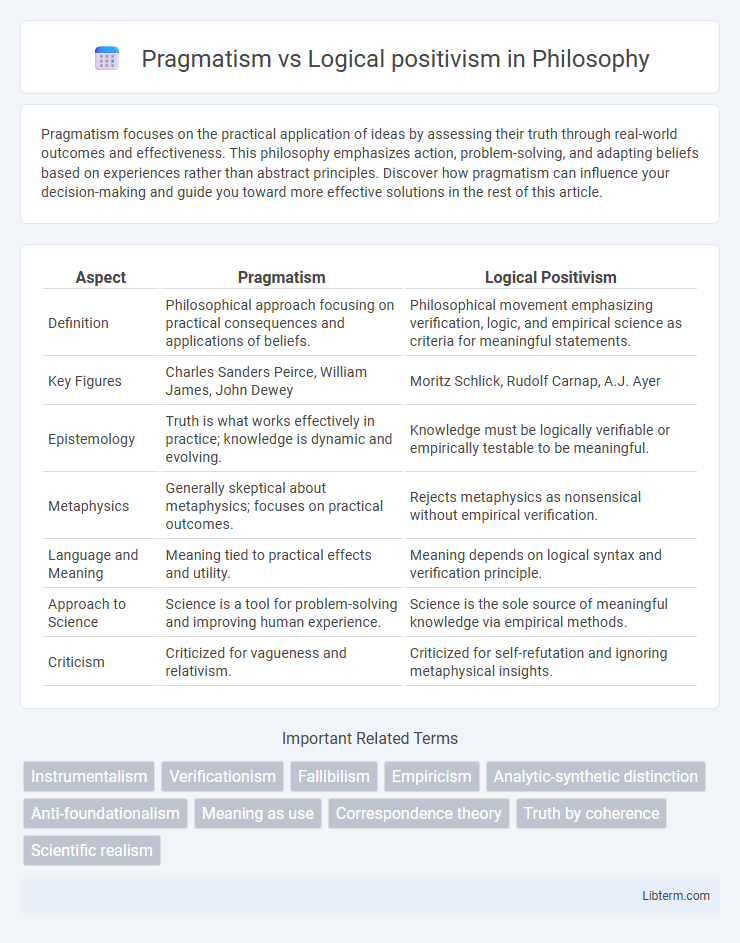Pragmatism focuses on the practical application of ideas by assessing their truth through real-world outcomes and effectiveness. This philosophy emphasizes action, problem-solving, and adapting beliefs based on experiences rather than abstract principles. Discover how pragmatism can influence your decision-making and guide you toward more effective solutions in the rest of this article.
Table of Comparison
| Aspect | Pragmatism | Logical Positivism |
|---|---|---|
| Definition | Philosophical approach focusing on practical consequences and applications of beliefs. | Philosophical movement emphasizing verification, logic, and empirical science as criteria for meaningful statements. |
| Key Figures | Charles Sanders Peirce, William James, John Dewey | Moritz Schlick, Rudolf Carnap, A.J. Ayer |
| Epistemology | Truth is what works effectively in practice; knowledge is dynamic and evolving. | Knowledge must be logically verifiable or empirically testable to be meaningful. |
| Metaphysics | Generally skeptical about metaphysics; focuses on practical outcomes. | Rejects metaphysics as nonsensical without empirical verification. |
| Language and Meaning | Meaning tied to practical effects and utility. | Meaning depends on logical syntax and verification principle. |
| Approach to Science | Science is a tool for problem-solving and improving human experience. | Science is the sole source of meaningful knowledge via empirical methods. |
| Criticism | Criticized for vagueness and relativism. | Criticized for self-refutation and ignoring metaphysical insights. |
Introduction to Pragmatism and Logical Positivism
Pragmatism, rooted in the works of Charles Sanders Peirce and William James, emphasizes the practical application of ideas and the truth as what works in experiential terms. Logical Positivism, founded by the Vienna Circle, asserts that meaningful statements must be either empirically verifiable or tautological, rejecting metaphysics and focusing on logical analysis of language. Both philosophies seek clarity and scientific rigor in knowledge but diverge in their approach to meaning, with Pragmatism valuing practical consequences and Logical Positivism prioritizing empirical verifiability.
Historical Origins and Key Figures
Pragmatism emerged in the late 19th century primarily through the works of Charles Sanders Peirce, William James, and John Dewey, emphasizing practical consequences and experiential verification as criteria for meaning and truth. Logical positivism developed in the early 20th century within the Vienna Circle, founded by Moritz Schlick and influenced by thinkers like Rudolf Carnap and A.J. Ayer, focusing on logical analysis and empirical verification to eliminate metaphysics. Both movements shaped the evolution of analytic philosophy, with pragmatism prioritizing practical application and logical positivism emphasizing formal logic and linguistic clarity.
Core Principles of Pragmatism
Pragmatism centers on the belief that the truth of an idea is determined by its practical consequences and usefulness in real-world applications. It emphasizes experiential learning, the adaptability of beliefs, and the continuous evaluation of ideas based on their outcomes. Key figures such as Charles Sanders Peirce, William James, and John Dewey advocate for knowledge as a tool for problem-solving rather than as an absolute representation of reality.
Foundational Tenets of Logical Positivism
Logical positivism emphasizes verificationism, asserting that meaningful statements are either empirically verifiable or logically necessary, thus rejecting metaphysical claims as nonsensical. Its foundational tenets include the reliance on sensory experience as the ultimate source of knowledge and the principle of logical analysis to clarify language and eliminate ambiguity. This philosophy prioritizes a rigorous scientific approach to knowledge, contrasting with pragmatism's focus on practical consequences and utility in truth evaluation.
Methods of Inquiry and Verification
Pragmatism emphasizes inquiry through practical consequences and experiential testing, valuing ideas based on their applicability and effects in real-world situations. Logical positivism relies on verification via empirical observation and logical analysis, insisting that meaningful statements must be either empirically verifiable or analytically true. While pragmatism allows flexible, context-dependent methods of verification, logical positivism maintains strict criteria of observational and linguistic clarification for meaningfulness.
Role of Experience and Observation
Pragmatism values experience and observation as essential tools for validating ideas through practical outcomes and real-world applications. Logical positivism emphasizes observation as the sole basis for meaningful knowledge, relying heavily on empirical verification and logical analysis. Both philosophies prioritize empirical data, but pragmatism incorporates experience as a dynamic, context-driven process, while logical positivism seeks strict, formal criteria for verification.
Truth, Meaning, and Language
Pragmatism defines truth as the practical consequences and usefulness of beliefs, emphasizing meaning through experiential verification and language as a tool for inquiry and action. Logical positivism asserts truth as empirical verifiability, meaning derived strictly from logical and scientific analysis, and language structured by formal logic to eliminate metaphysical ambiguities. Both perspectives prioritize language's role in shaping understanding, yet pragmatism embraces contextual, evolving interpretations while logical positivism demands precise, verifiable statements.
Critiques and Limitations
Pragmatism faces critiques for its reliance on practical consequences as the measure of truth, which can lead to relativism and undermine objective knowledge. Logical positivism is limited by its strict verification principle, which excludes metaphysical and ethical statements from meaningful discourse, thus narrowing the scope of meaningful knowledge. Both philosophies struggle with addressing abstract concepts that resist empirical verification or pragmatic utility, highlighting fundamental challenges in defining truth and meaning.
Influence on Modern Philosophy and Science
Pragmatism shaped modern philosophy by emphasizing practical consequences and experiential learning as core to truth and knowledge, influencing scientific inquiry to prioritize hypothesis testing and application. Logical positivism contributed by advocating for empirical verification and logical analysis, reinforcing the scientific method's reliance on observable, measurable phenomena. Together, these movements advanced a rigorous, evidence-based approach in philosophy and science, fostering developments in analytic philosophy and scientific realism.
Comparative Analysis: Pragmatism vs Logical Positivism
Pragmatism emphasizes the practical consequences and usefulness of beliefs as the key criteria for truth, while Logical Positivism strictly demands verifiability through empirical observation and logical analysis. Pragmatism supports a flexible, evolving understanding of knowledge based on experience, contrasting with Logical Positivism's rigid demarcation between meaningful and meaningless propositions. The pragmatic approach integrates human values and context, whereas Logical Positivism seeks to eliminate metaphysics and focus solely on scientifically verifiable statements.
Pragmatism Infographic

 libterm.com
libterm.com